Understanding the Difference Between the Various Electrician Types
When you need an electrician, it’s important to know who you should call. Some electricians are considered commercial electricians and they work primarily in commercial buildings. Other electricians work primarily in residential buildings or industrial buildings. When you need an electrician to come out and work on your high voltage systems, you need to make sure you’re choosing the right type of electrician.
Residential Versus Industrial Versus Commercial Electrician
The typical work done by residential electricians includes:
- Basic electrical repairs
- Maintaining electrical systems
- Installing lighting and associated fixtures
- Wiring newly constructed homes
The work environment for residential electricians is generally relatively safe and straightforward. Most residential electricians work primarily with single-phase power supplies (up to 240 volts).
Industrial electricians perform more complicated and sometimes dangerous electrical work with high voltage systems. Industrial electricians commonly:
- Troubleshoot electronics and controls in an industrial setting
- Ensure proper installation of power conductors
- Install electrical systems and their various components for industrial equipment
- Provide other industrial electrical services as needed
Often, industrial electricians work in production facilities and other industrial buildings that have expensive machinery and complex electrical systems. The power needs in these facilities are typically far different than the power needs in residential or even commercial settings. Industrial electricians commonly work on electrical systems in the food processing, pharmaceutical, mining, automotive and chemical industries.
The work done by commercial electricians includes:
- Commercial electrical wiring installation
- Repairing and installing specific types of electrical equipment
- Wiring generators, lighting, breaker panels, transformers and more
- Taking care of general electrical requirements in commercial buildings
Commercial electricians typically work on electrical systems in restaurants, offices, retail stores and other commercial buildings that are open to the public.
Education and Experience Requirements
Different types of electricians require various levels of training and education. For example, residential electricians require a high school diploma and completion of an apprenticeship program. Residential electricians must also pass a competency exam and complete at least 8,000 hours of on-the-job experience before they can become licensed.
Industrial electricians must have a high school diploma, complete an apprenticeship program, and pass a competency exam after completing at least 8,000 hours on the job. After they complete these requirements, they can become licensed. These requirements sound the same as the requirements for a residential electrician, but an industrial electrician goes through an apprenticeship program that’s targeted to industrial electrical work.
Commercial electricians must complete the same education and training requirements as residential and industrial electricians (at least 8,000 hours of training on the job, an apprenticeship program, and a high school diploma). The apprenticeship program for commercial electricians focuses on commercial electrical work.
Though the general overview of education and experience required for each type of electrician looks similar on the surface, the professions are all very different from each other. The type of knowledge required to perform residential vs. industrial vs. commercial electrical repairs and installations varies significantly. That’s why you should never call a residential electrician to work on your industrial building, and vice versa.
Deciding Which Type of Electrician to Call
When it comes to your electrical needs, do you know what type of electrician you should call? The good news is that the friendly and knowledgeable electricians at Exceptional Electric are qualified to work on both residential and commercial electrical systems. We can provide you with leading electrical services in all of the following areas:
- Computer and network cabling
- Hot tub and spa circuits
- Code corrections
- Landscape and outdoor lighting
- Outlets and circuits
- Breakers and fuses
We can also install solar panels and take care of any commercial or residential electrical repair or maintenance needs you have. We encourage you to check out our customer reviews to see what people have to say about the work our commercial electricians do.
Schedule Your Commercial Electrician Appointment
Whether you need new lighting installed or you’re having problems with your current electrical wiring, the top-class electricians here at Exceptional Electric can help. Our electricians go through all the proper education and training to become licensed to work in both residential and commercial buildings. That means we can install, repair or maintain the electrical systems in your home or apartment, as well as the electrical systems in your restaurant or other commercial building.
We pledge to provide you with the best electrical services possible, no matter what your underlying electrical issues may be. To request an appointment with a skilled commercial electrician on our team, give us a call during regular business hours or fill out our convenient online form.
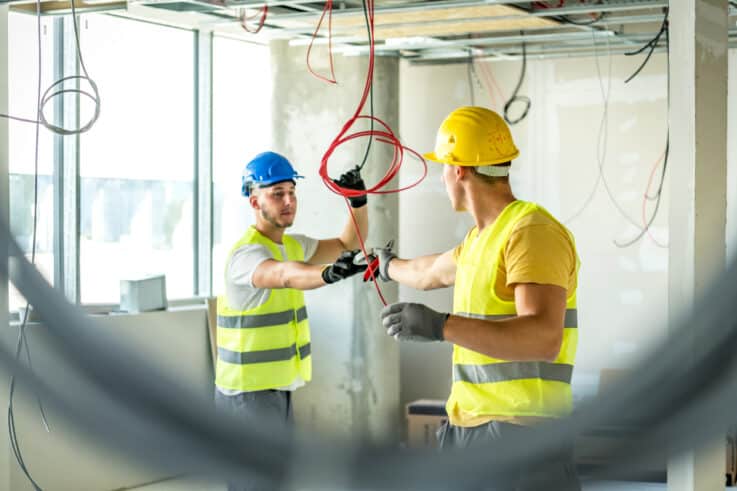 Essential Lighting Solutions for Small Businesses
Essential Lighting Solutions for Small Businesses
You’ve found the ideal spot for your small business, and you have everything in order for opening day. Did you remember to have a commercial electrician help you light your space effectively? Exceptional Electric specializes in electrical work in commercial buildings, which involves providing clients with commercial lighting solutions and ideas to help them save money and brighten their business opportunities. Keep these insights in mind to help bring out the best in your small business’s electrical system.
Switch to LED
If you don’t already have them, consider installing LED lights. These efficient lights don’t require as much wattage as standard compact fluorescent and incandescent bulbs. While LED lights are more expensive, they help save you money over time. Other than efficiency, another great thing about LED lights is they can last as long as 11 years. When you don’t replace your lights as much, you don’t spend as much.
Schedule an Energy Audit
You may not need an energy audit right now if you moved into a newer storefront for your business. At least once a year, let a professional experienced in maintaining electrical systems in commercial buildings perform an energy audit. That way, you can learn about small issues that degrade your electrical system and increase your energy bills sooner rather than later.
As a small business owner, you may not have the money to afford regular energy audits. If not, it’s a good idea to use an online energy-saving calculator. After plugging in details about your business, you receive tips to reduce your energy costs.
Consider Letting Employees Work From Home
Depending on your industry, your employees could perform their duties from home rather than come into the office every day. You could save a lot of money on overhead costs and office equipment by letting your staff work from home. You have plenty of free video chat applications that keep you connected with your workers.
Perhaps you cannot offer employees a work-from-home option. If not, try to implement a work-from-home day once a month. That way, you need not worry about turning on the lights and other office equipment at least one workday a month.
Market Your Energy-Saving Methods
Today’s consumers love supporting conscientious companies, especially small businesses. Rather than keep your energy-saving methods quiet, include them in your marketing strategy. Let your current customers and potential customers know you care about doing your part to protect the environment and take advantage of efficient lighting solutions.
Research Tax Incentives
When business owners invest in energy-efficient business equipment and appliances, the government may offer tax incentives. Check with the Office of Energy Efficiency & Renewable Energy for the latest tax incentives. You can also look into local and state government incentives.
Use Dimmer Switches
You more than likely don’t need all the lights in your business to operate at full brightness. Switch to dimmer switches if you don’t have them already, so you and your employees can choose the level of brightness you feel most comfortable with. When light bulbs don’t operate at full brightness, they don’t require as much electricity, which means you don’t spend as much money. Make life easier and more comfortably lit for your staff by investing in dimmer switches.
Cut the Lights Off
Try to help your employees remember to cut lights off when they’re not using them by posting helpful reminders near light switches. If you leave lights on after hours as a security measure, consider investing in security cameras, alarms and similar, more effective security measures.
Use Natural Light as Much as Possible
If certain areas and rooms in your business get plenty of natural light, take advantage of it. Skylights let light pour down and light up entire rooms, so consider investing in them if your budget allows. Aside from saving money and energy, another benefit of natural lighting is it helps boost employee morale and happiness. Many workers consider natural lighting a workplace perk.
Use Light Sensors and Control
Aside from depending on employees to cut the lights off, you can also use sensors and controls to shut off lights in empty rooms. Motion sensors cut lights off or on when necessary, and daylight controls adjust interior lighting according to available daylight. Never again must you worry about lights being left on and running up your energy bills.
Contact a Commercial Electrician Today
Could you use more electrical solutions to improve your work environment? Contact Exceptional Electric today to set up an appointment by calling 636-322-7119 or submitting an online form.
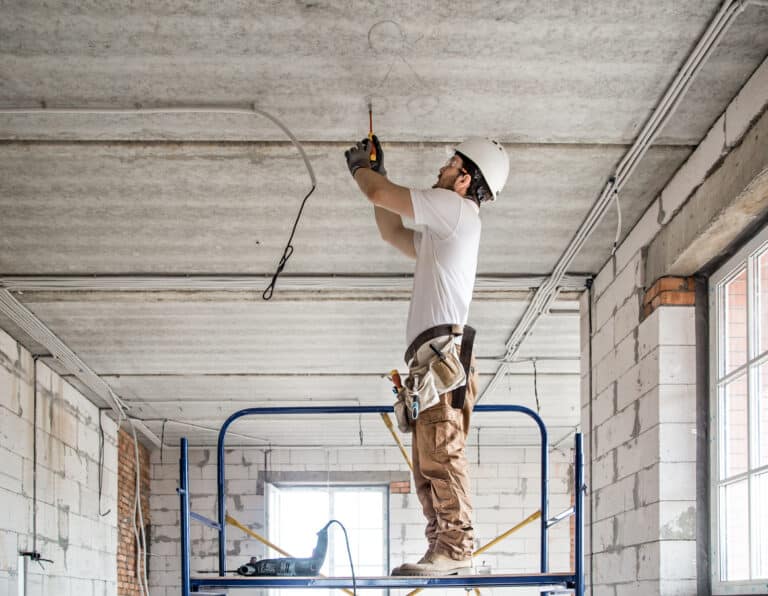 Understanding the Difference Between Industrial Electricians and Commercial Electricians
Understanding the Difference Between Industrial Electricians and Commercial Electricians
Business owners depend on several professionals to help them bring out the best in their company and take care of their customers. When a physical store needs electrical work, entrepreneurs must know what kind of electrical professional to work with. Understanding the difference between an industrial electrician and a commercial electrician better ensures business owners get the job done right the first time. Not to worry, Exceptional Electric is here to help.
Industrial Electrician
An industrial electrician’s job involves servicing, testing and repairing electrical equipment in work environments such as mines, factories and plants. Because of the amount of training required to earn a license, these professionals have more expertise in their field.
Examples of typical work industrial electricians perform include reading and drafting blueprints, programming equipment, installing and measuring hardware, and keeping a facility’s electrical system up-to-date and up to code. Their position also requires them to use special industry tools, such as a voltmeter, as preventative measures to keep facilities safe. Depending on the work environment, an industrial electrician may receive training on using special equipment, such as robots.
Tasks to hire an industrial electrician for include:
- Installing electrical components and systems for production and manufacturing companies
- Conducting electrical tests in industrial settings
- Inspecting electronics and electricity in industrial work environments
- Repairing and cleaning electrical components like wiring and circuitry
- Grounding electrical systems and products in industrial settings
Entrepreneurs in the industrial sector may also hire industrial engineers to install outlets and fixtures.
Commercial Electrician
After earning a degree and completing an apprenticeship, a person becomes a commercial electrician who works in stores, offices and restaurants. Usually, commercial electricians work in businesses easily accessible to the public. These electricians focus on making sure a company’s electrical systems and components, such as the lighting and HVAC systems, work safely and properly.
Examples of tools commercial electricians use include pliers, screwdrivers, drills, power tools and knives. Their job duties may require them to manage apprentices and other electricians. Jobs to work with a commercial electrician for include:
- Designing electrical systems
- Installing security systems
- Installing brand-new electrical equipment
- Rewire existing electrical equipment
Commercial electricians also create and work from blueprints.
What To Look for When Hiring a Commercial Electrician
When your company needs a commercial electrician’s help, you must know what qualities to look for. While we hope Exceptional Electric is your first and last call for outstanding electrical work, we know you have your fair share of options. When you know what to look for in a reputable electrical technician, you narrow your options and feel confident about your final choice.
Accreditation and Licensing
Any electrical professional with access to your business should have a current license and certification from a reputable industry organization. Do not hesitate to ask for an electrician’s accreditations or license, as a good one does not mind showing you and may even share her or his professional credentials without asking.
Safety
To improve their chances of receiving a bid, some electricians maintain a safety record. It may reassure you to see the electrician’s record, so you know you and your company are in excellent hands. If an electrician does not maintain safety records, potential customers may ask old clients about the professional’s focus on safety. By checking the electrician’s bond status, you could see whether she or he has outstanding claims.
Insurance
While you hope for nothing but favorable results when taking care of your business’s electrical components and systems, you never know when disaster may strike. If it does, working with a commercial electrical professional who has insurance could take a lot of stress off both your shoulders. Always ask to see proof of insurance before hiring an electrician, no matter if it’s for your home or your business.
Emergency Services
You may need emergency electrical services on the weekend or holiday or late at night. Consider working with a company that offers 24/7 emergency service. That way, when calamity strikes, there’s less of a chance of it affecting business operations.
Knowledge of Current Codes
The National Electric Code establishes safety codes for industrial, commercial and residential electricians. Some areas have local codes electricians must know about and follow. If a technician violates a code, your business could suffer avoidable fines and require a rework, which could threaten your company’s success and cost you more money.
Contact Us
The next time you need a well-experienced electrician for your business, save yourself time and call Exceptional Electric. To schedule an appointment, contact one of our representatives at 636-322-7119.
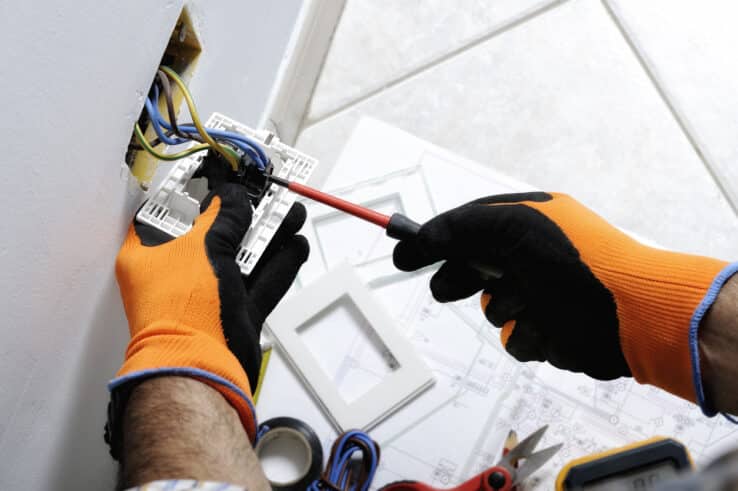 Commercial Electrician Services
Commercial Electrician Services
Not every electrician can perform commercial electrician services. A special skill set and know-how are required for commercial wiring, repairs, and maintaining electrical systems. The pros at Exceptional Electric have all the expertise and training necessary to handle your commercial projects.
The Work We Do
Our work in commercial buildings encompasses a complete array of electrical services. Our typical work includes the following:
- Exhaust fans
- Lighting maintenance
- Transformers
- Data and communication lines
- Lighted sign repair
- Parking lot lighting
- Ballast and lamp replacement
- 220-volt circuits
- Dedicated circuits
If you have an older commercial building, your wiring may need an update. Old wiring schematics did not anticipate the demands of modern-day equipment. Computers, printers, and HVAC systems can wreak havoc on wiring systems not built to handle it. If your building was built before 1960, it’s good to inspect and possibly replace the wiring.
We can install the electrical wiring for brand-new construction and replace the wiring in older buildings. In addition, our commercial electricians will make sure you understand the electrical system in your facility and will teach you how to maintain it to run at peak efficiency.
The Signs Your Electrical System Is Faulty
You should be aware of the warning signs that your electrical system is going bad. Knowing when to call your commercial electrician is part of operating your building safely. In addition to having regularly-scheduled inspections of your electrical wiring, keep an eye out for signs of wear or failure, such as:
- A burning odor
- Sparking near outlets, light fixtures, or other electrical sources
- Breakers are tripped frequently as a part of a typical day’s work
- Occasional smoke in the building
- The electrical panel is hot to the touch
- The material around light switches or outlets is warped
- Lights flicker unexpectedly
A quick way to determine if it’s time for an electrical upgrade is to notice how many extension cords or power strips are in use. If there are a lot, it’s a sign that you don’t have enough outlets for your workspace. Too many extension cords can overload your circuits. They should never be more than a temporary solution. Talk to the experts at Exceptional Electric about how to upgrade for your energy needs.
What To Expect With New Construction
Building a new commercial building involves a lot of steps. Make sure your commercial electrician is a part of the process. Talk to your general contractor about the work the electrician will do and when it will occur. There are two basic phases to the electrical work; roughing in and installing fixtures.
Roughing in occurs after the framing and walls are complete but before the drywall goes up. It involves running all the electrical wires and cables through the studs and inserting them into the ceiling and wall boxes. After this is completed, the work should be inspected by the municipality.
For phase two, your electrician will install light switches, outlets, light fixtures, and other electrical devices such as routers or appliances. Ceiling fans are included here also.
Exceptional Electric has experience in new construction. Our professionals know how to install dedicated circuits, electrical boxes, and proper cable anchoring. If you need surge protection for some of your electrical devices, we can install isolated ground receptacles that protect your expensive equipment.
Professional From Start to Finish
Exceptional Electric has the highest of standards no matter the type or size of your project. We strive to be punctual and dependable. If there is a delay due to unforeseen schedule changes or the need for supplies, we will communicate that to you. We understand that time is money and that you need your commercial building to function properly at all times.
We can help your business look its best, too. If you have exterior signage, building lighting, or parking lot lighting, we can keep it in repair. Make sure your building is up to code and safe for employees and customers alike with our services.
Don’t forget about pole light maintenance. Many commercial buildings have exterior pole lights lining the sidewalk or in the parking lot. They serve as a crime deterrent and help to keep your property safe. These outdoor fixtures are at the mercy of nature and can rust and corrode. Schedule regular inspections to ensure that they are always working well.
Call on the commercial electricians who are licensed, bonded, and insured. With years of experience in the St. Louis area, Exceptional Electric has the expertise to keep your commercial building well-lit and running for years to come.
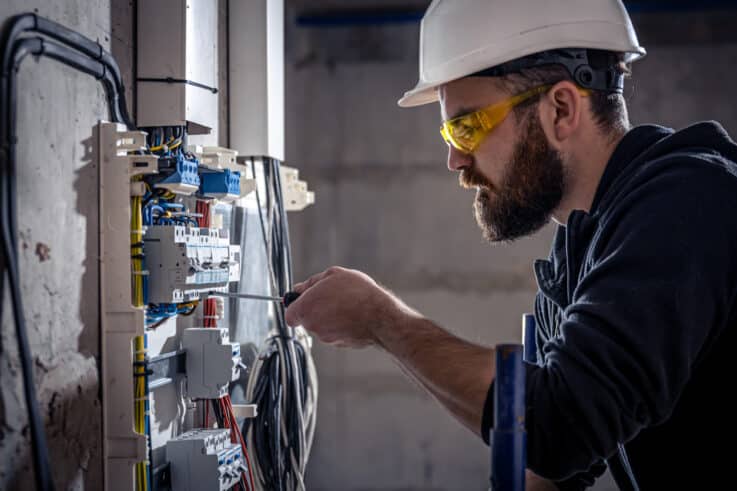
Finding the Right Commercial Electrician
Keeping up with the electrical systems of an industrial or commercial building is much more involved than simply working with residential wiring and appliance connections. There are many things to consider when dealing with large properties, and a commercial electrician would need to address problems in commercial buildings. There are significant differences between residential and commercial electricians, with only those trained in commercial skills able to handle the demanding and complex nature of industrial wiring.
Hiring the Right Commercial Electrical Company
Thanks to the Internet and social media platforms, you can find several prospects for commercial electrical work in your area. Unfortunately, a website or single review might not give you the complete picture of the company that can handle your project. There are several things a reputable commercial electrical company should be able to show or provide, and these deal with the training of their electricians, their reputation and their services.
Training for Commercial Electricians
The typical path toward commercial electrician employment involves classroom training and significant work experience. Those looking to pursue a career as this type of electrician need to have a GED or high school diploma. While some technical colleges have an electrical school, others work with a contractor association or trade union to enroll in an electrician apprenticeship program.
The apprenticeship program for commercial electricians includes blueprint reading, electrical theory, electrical regulations and industrial safety procedures. Apprenticeship programs generally take four to five years, with a prospective electrician going through 144 hours of classroom training and 2,000 work hours.
Skills and Abilities of Commercial Electricians
The typical work of commercial electricians involves large industrial or commercial buildings where high voltage wiring and equipment are found. In the early stages of a new development project, commercial electricians work to set up the proper wiring and electrical systems. If these plans aren’t accurately designed and followed, it can severely complicate the rest of the construction process. In addition to the requests from the project manager or developer, there are also building codes that apply to electrical work. The smallest error or malfunction could lead to a significant safety concern.
Any sign of trouble with your electrical system demands professional help from a commercial electrical company. Don’t cut corners by calling on your building’s maintenance man or trying to solve the problem on your own. Your safety, as well as those who work at, live in or visit the building, is at stake when there is a commercial wiring problem. A reputable, qualified electrical service company can handle these electrical problems.
1. Flickering Lights
Lightbulbs that flicker could indicate the need to be replaced, but if you see that the lights continue to flicker or go dim after the bulbs have been changed, you should call an electrician. It could be that the connection has gone bad. If you decide to add to your lighting fixtures without consulting an electrician, you could have a similar issue with an inconsistent power supply.
2. Inconsistent Power Supply
Your facility could experience severe equipment damage if your electrical connections are inconsistent. Worn-out materials or faulty wiring could cause your power to dip or sag. You need an experienced electrician to evaluate the commercial wiring in the building. Electrical surges could be the result of poor wiring.
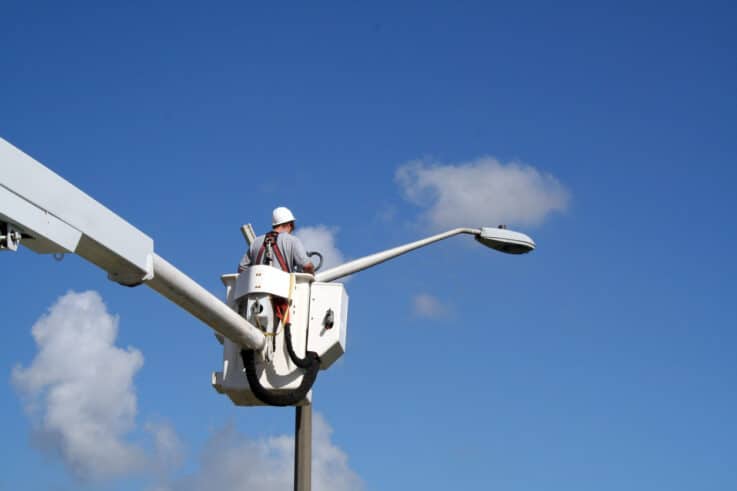 Meet Your Local Residential Electrician
Meet Your Local Residential Electrician
If your home is powered by electricity, you should get to know your local residential electrician. This skilled professional is responsible for installing and repairing the electrical systems that power your home. Not everyone can be an electrician, as it takes special licensing requirements and years of experience to safely install new lighting, make panel changes, equip a house with surge protection and more. Here’s what you should know about the licensed electricians at Exceptional Electric.
Duties and Roles of an Electrician
The primary job description for these tradespeople focuses on maintaining electrical systems in a residential setting. They will install, inspect, maintain and repair the systems already in a house or work with a contractor to install them for a new development. Depending on the project, an electrician might lead or oversee a team of electricians to get a job done.
Duties
Over the years, an electrician may encounter a number of service requests. The common duties of this type of electrician include:
- Installation of new wiring or lighting
- Replacing broken components
- Deciphering technical drawings and blueprints for construction or remodeling projects
- Ensuring the safety of installed wiring or electrical devices through inspection
- Diagnostic services when the homeowner reports a problem
- Understanding and compliance with local regulations and the national electrical code for a safe electrical system
Roles
Electricians have different classifications based on their experience and training. Formal training and on-the-job experience can help an electrician move more quickly through these classifications.
Apprentice
This is a technician who works alongside a more experienced professional and learns of the trade through hands-on training. This supervision lasts several years before the individual can progress to the next tier.
Journeyman
A technician needs more than just hands-on training from a supervisor. The technician must attend an apprenticeship program and be approved as competent in the various skills of the trade before being officially categorized as a journeyman electrician.
Master
As time goes on and the journeyman gains years of experience, he or she can advance to the next category of electricians. A master electrician must demonstrate high competency in all areas of residential electricity. It is typically the master electricians who oversee apprentices or journeymen.
Licensing Requirements for an Electrician
Each state has a set of licensing requirements for those looking to work as an electrician. In Missouri, electrician licenses are issued through individual cities. The licensing process starts with gaining the necessary experience, and there are requirements on the number of hours needed for approval. For a journeyman electrician license, the individual is required to have 8,000 hours of experience.
In order to sit for the basic electrical exam, an individual must complete one of the following requirements:
- Complete 8,000 hours/five years of full-time work experience and 500 to 1,000 hours of classroom training
- Complete 8,000 hours of electrical work under the supervision of a licensed electrician and hold an associate’s degree in electrical engineering or electrical technology
- Supply proof of 4,000 hours of electrical trade work experience under the direct supervision of a licensed master electrician and hold a bachelor’s degree in either electrical technology or electrical engineering
- Complete a minimum of 12,000 of electrical trade work under the supervision of a master licensed electrician and present the required verification documentation
The formal training received in the classroom can come through an approved trade school or through an apprenticeship program, where the following topics and more are covered:
- Electrical code
- Grounding electrical
- Fiber optic electrical
- Tech electrical
- Fire alarm and security
- Conduit bending
- Safety and electrical hazards
A benefit of attending trade school is the opportunity to have supervised job training. Under a licensed professional, the apprentice learns how to wire a circuit breaker, install wiring and check on voltage.
Preferred Skills in an Electrician
There are some job-related skills that can’t be taught in a classroom. A mechanical aptitude goes a long way to increase the confidence and comfort an electrician feels while on the job. Employing problem-solving skills makes it easier to diagnose and fix problems. Reading comprehension is a must-have for working with reports and interpreting job orders, and communication skills are vital for working with customers, peers, vendors and inspectors.
Although it may not seem important at the apprentice stage, an electrician should also demonstrate strong business skills. As ta residential electrician moves toward becoming a master electrician, there is the opportunity to become an independent contractor. This would require managing invoices, teams of employees, inventory and proposals.
Qualified Electricians in Your Neighborhood
The residential electricians at Exceptional Electric as highly experienced and thoroughly trained. Whatever your electrical needs, our team can determine a safe solution.
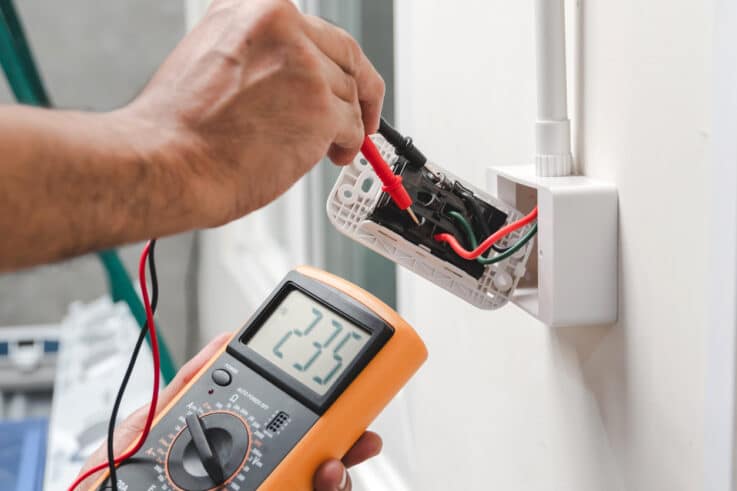 Residential vs. Commercial vs. Industrial Electricians: Which One Should I Hire For My Job?
Residential vs. Commercial vs. Industrial Electricians: Which One Should I Hire For My Job?
Electrical work is a serious job that requires serious concentration. After all, electricians spend their days around high-voltage wires that may injure them, catch on fire, or worse if not handled properly. For this reason, it is vital that you hire someone professional for all of your electrical jobs. Of course, understanding the differences between commercial electricians, residential electricians and industrial electricians is important for knowing which one you need for your job.
Commercial Electricians
While these electricians can technically work in residential buildings, they tend to stick to retail stores, office buildings, or larger apartment buildings as part of their work environment. These electricians typically use three phases to wire these buildings, which means that two phases run one voltage and the larger third one runs the other. The smaller ones can be 208-277 volts while the larger leg can be up to 480 volts.
Job Duties
Like residential electricians, commercial ones install wiring, lighting, and other electrical components, such as panels. They may also create retrofit lighting that provides a more energy-efficient option for the businesses using the lighting. Other duties include maintaining the electrical panels and providing emergency electrical services when problems knock out a company’s ability to do business.
Schooling
Commercial electricians are required to have a high school diploma or G.E.D. They do not legally need to have a college degree, but an electrical program in a vocational school does tend to be helpful. Additionally, some companies only hire electricians that have an associate’s or bachelor’s degree in a related field.
Like residential electricians, commercial electrician hopefuls must undergo an apprenticeship and work closely with a master electrician. The required number of hours varies by state. Once qualified, a commercial hopeful must take his or her state’s journeyman exam. Passing it allows the person to work as a commercial electrician.
Residential Electricians
Residential electricians are responsible for working inside single-family homes, duplexes, or in businesses that use a former home as a current business site.
Job Duties
Residential electricians work with single-phase power supplies, most typically in 120 or 240 volts. They wrap their work in sheath insulation that is easy to hide behind walls, which is important for ensuring the aesthetic appeal of a home remains intact as well as for protecting the home’s occupants from dangerous electrical currents.
A residential electrician focuses on installation, repairs, and updates. He or she may be responsible for wiring new homes in a subdivision, for updating the wiring in old homes, or for repairing electrical issues as they arise. Typical tasks include replacing electrical panels, installing showcase lighting, and even installing ceiling fans. He or she may or may not offer emergency repair services.
Schooling
College is not a requirement for residential electricians, but they do need to have a high school diploma or G.E.D. Some people who want to become electricians find it helpful to take courses in electrical technology or shop at vocational schools. Someone who wants to work as an electrician inside residential homes must complete an apprenticeship program that includes up to 10,000 hours of on-the-job experience. After completing an apprenticeship, a hopeful electrician typically needs to pass an exam to obtain a state license.
Industrial Electricians
Industrial electricians have the same qualifications as commercial electricians but prefer to work in mines, chemical plants, factories, and other types of industrial sites that have high voltage. They also use a three-phase power setup, but they tend to work with RMC conduits instead of MTC or MC cables. The conduit powers the motors, control circuitry, and other instrumentation.
Job Duties
Industrial electricians create wiring specific to the type of industry that will be using the site. Because most industrial sites use large machines, they are also responsible for grounding machinery, maintaining their electrical components, and testing and repairing the machinery as needed.
Schooling
Only master electricians can work on industrial sites. First, the hopeful industrial electrician needs to get a high school diploma or GED. Like other jobs in the field, it’s a good idea to complete a training program at a trade school. Once complete, a hopeful industrial electrician must apprentice for 4-5 years, pass the journeyman exam, and work semi-independently under a master. After passing the master exam, he or she can begin working independently. Ongoing education and obtaining industry certifications are always good ideas.
Work With Professional Commercial, Residential and Industrial Electricians
Do you want to add recessed lighting to your home? Perhaps you’re opening your own storefront and want to ensure that everything is up to par. Regardless of what you need from your residential or commercial electricians, Exceptional Electric has the professionalism, talent, and experience that you need to ensure a job is done right. Contact us today to learn how we can help.
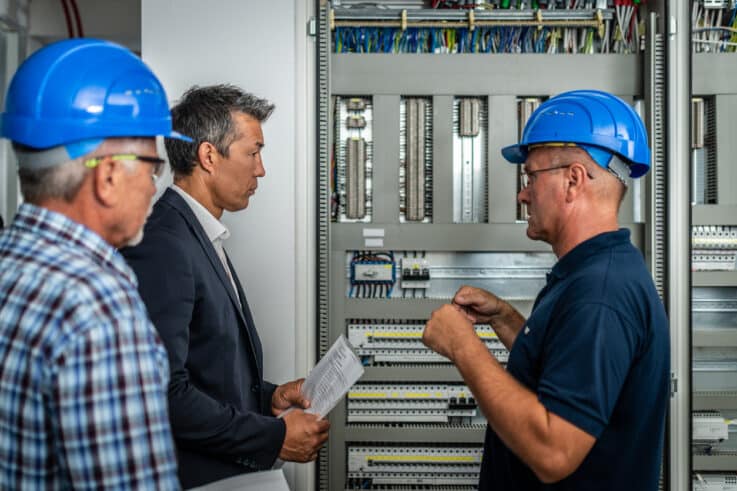
The Differences Between a Residential and Commercial Electrician
Many people do not realize that electricians have specific specializations or qualifications. For example, a residential electrician cannot perform the same tasks with the same properties as a commercial electrician. As a consumer, you need to know which type of electrician you need to ensure your electrical project is legal and adheres to all state and federal regulations. Before you hire anyone for electrical work, understand the difference between these two professions.
Defining the Role of a Commercial Electrician
Someone specializing in commercial electrical work understands the wiring and electrical systems in commercial buildings like restaurants or medical offices.
Commercial wiring often deals with high voltage systems, so licensed commercial electricians includes those individuals comfortable in that type of work environment. The typical work for these electricians includes installs, system maintenance, and repairs.
Job Responsibilities
While these electricians work in commercial buildings, their day-to-day can seem somewhat similar to other types of electricians. Professionals working in commercial electrical will typically:
-
Install, maintain, and repair wiring, light fixtures, outlets, and other equipment
-
Provide system advice and recommendations to business owners
-
Troubleshoot electrical problems while following regulations and building codes
Training
A commercial electrician will need more training than a residential electrician. These professionals must complete an apprenticeship program that typically lasts four years but can be longer. During their apprenticeship, they will learn from experienced electricians through on-the-job training.
Licensing
Licensing requirements vary from state to state, but in Missouri, an electrician will usually need to complete a minimum of 8,000 hours of work experience and up to 1,000 hours of classroom experience. Also, the state requires an associate’s degree in an electrical field, either engineering or technology.
Defining the Role of a Residential Electrician
A residential electrician cannot work on commercial electrical systems. They receive training on residential systems and property specifically. Maintaining electrical systems in a house differs from maintaining them on a commercial property. On a residential property, an electrician primarily works with single-phase systems, 120-volt circuits, and non-metallic sheathed cables. A commercial electrician mainly works on three-phase electrical systems, 240-circuits, and electrical metallic tubing.
Residential electricians are not less skilled than commercial electricians; they are only trained differently. These professionals typically wire:
-
New home construction
-
Home additions and remodels
-
Outlets, fixtures, switches, security systems, smoke detectors
Job Responsibilities
Residential electricians may perform several different tasks throughout a typical day. For example, an electrician might need to install light fixtures or outlets in one property and update the wiring in another. They may also need to troubleshoot electrical problems following local regulations and building codes. Finally, a residential electrician may advise homeowners about electrical system upgrades to fit their needs.
Training
While commercial electricians work through more in-depth training on higher voltage systems, residential electricians still need to meet the relatively high demands of their state. In Missouri, residential professionals must hold a high school diploma or GED and enter an apprenticeship program. The apprenticeship program can last up to five years. When they complete the program, they can apply to become journeymen electricians.
Licensing
Like a commercial electrician, a residential electrician must meet specific requirements before receiving their license. They must successfully finish a minimum of 500 hours of classroom training and 8,000 hours of work experience.
Understanding the Importance of Electrical Compliance Standards
Each type of electrician must understand and obey a specific set of electrical compliance standards. The standards ensure the safety of the electricians and their clients. The three sets of standards include:
-
The National Electrical Code: Updated every three years, the NEC is a set of standards developed by the National Fire Protection Association. Commercial and residential electricians must follow the NEC.
-
Local building codes: Local municipalities create building codes on a range of topics, including electrical work. Both commercial and residential electricians must follow local building codes.
-
OSHA safety standards: The Occupational Safety and Health Administration sets safety standards for the workplace. Following OSHA standards ensures worker safety. Commercial electricians must follow the standards, and residential electricians should follow the standards to keep themselves and homeowners safe.
Hiring the Right Residential or Commercial Electrician for the Job
Whether you are looking for a residential or commercial electrician, you need to verify their qualifications. A quality service will hire apprentices, journeymen, and master electricians. It will also have appropriate licenses and insurance. Contact Exceptional Electric at 636-322-7119 to discuss your new electrical project or current system concerns. The company will send a team of qualified technicians to assess the site and issues and offer guidance.
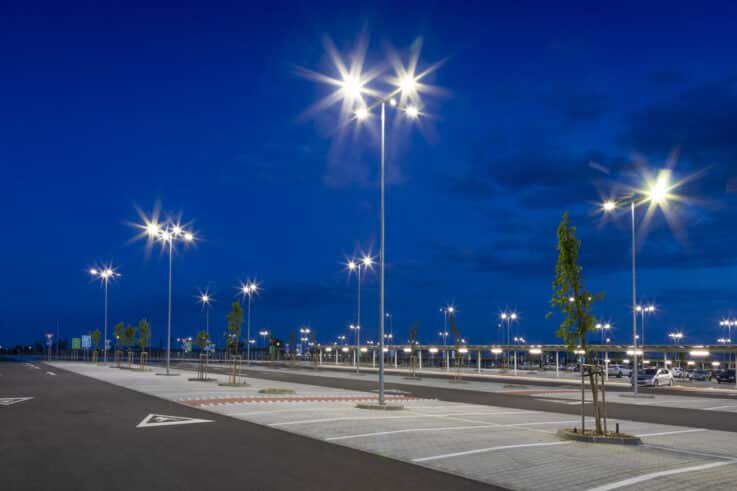 What Should You Hire a Commercial Electrican For?
What Should You Hire a Commercial Electrican For?
If you are trying to determine when you need to hire a commercial electrician, the answer might rest within the type of building you need electrical assistance with. The type of work these electricians do includes working in settings that are of a higher voltage than a normal residential area.
These guidelines can help you decide when you need to seek out a specific professional and what you should look for when working with this type of electrician.
You Need Help With Certain Wiring Systems
In general, commercial electricians work in settings that include larger wiring systems. This makes sense, because the average commercial space is bigger, and requires more power than a residential area. Most commercial wiring systems include tube conduits that are meant for bigger areas. The wiring and electrical are different from what you would find in a residential space, and can be dangerous if one doesn’t know how to work through it.
When you contact a professional to help you, give them as many details as you can about the wiring system, and make sure this is something they are skilled in.
You Require an Electrician With Specific Knowledge
The type of education that these electricians receive is different from what a residential electrician would know. Residential electricians get apprenticeships with a tradesman or someone similar and focus on working in homes. In contrast, a commercial electrician would focus on working with a larger company and have specific training related to the different types of work in commercial buildings that they would be exposed to on a daily basis.
Those who go through the apprenticeship would also have the benefit of seeing how other workers handle different scenarios and be able to ask questions along the way.
You want to feel confident that the professional you are choosing knows what to do and was trained properly, so it makes sense that you would seek out someone skilled in this type of setting.
The Building in Question is a Commercial Establishment
As mentioned earlier, commercial establishments have different needs from that of the average home. They usually have different levels of wiring, voltage, and even special systems that are only used in these kinds of settings. There can be a significant danger to working in an area that one is not skilled in, especially when it comes to these types of settings.
Commercial electricians are also willing to work around the needs of a business, such as working early in the morning or late at night to accommodate a store, whereas a residential electrician might keep normal daytime hours instead. Professionals who know how to manage these situations can disable areas that they need to minimize the risk of accidents and other problems that could occur when an area is not monitored for safety.
You Need Someone Skilled in High Voltage Areas
High-voltage areas possess a reasonable amount of danger. Residential electricians might not be used to a higher type of voltage or know what to do, let alone specific safety precautions that should be taken to avoid hazards to themselves or others. When commercial electricians work, they are trained on how to keep themselves and others safe, and what to expect.
The average home doesn’t go above 240 volts, whereas in most commercial spaces it can easily exceed that number. Not knowing how to manage the situation could lead to accidents, injuries, and even death. You want to feel confident that your business will be safe and that everyone who comes into the area knows how to proceed when dealing with high-voltage electrical systems.
This is just one reason why it is important to seek out someone who is skilled in commercial electrical and knows what to do.
Get the Help You Need From a Professional Commercial Electrician
If your establishment needs the expertise of a commercial electrician, you want to feel confident that you’ve found the right person for the job and that they know what to do. Rather than try and locate one on your own, it can be helpful to turn to a company that knows just how to handle the situation.
When you contact Exceptional Electric, we will send a professional out to your business who can safely evaluate your company’s needs and move forward with any work that needs to be performed. This can ensure the safety of you and your customers while having the work done in a timely manner. If you are ready to get started, contact us today, and find out how we can help
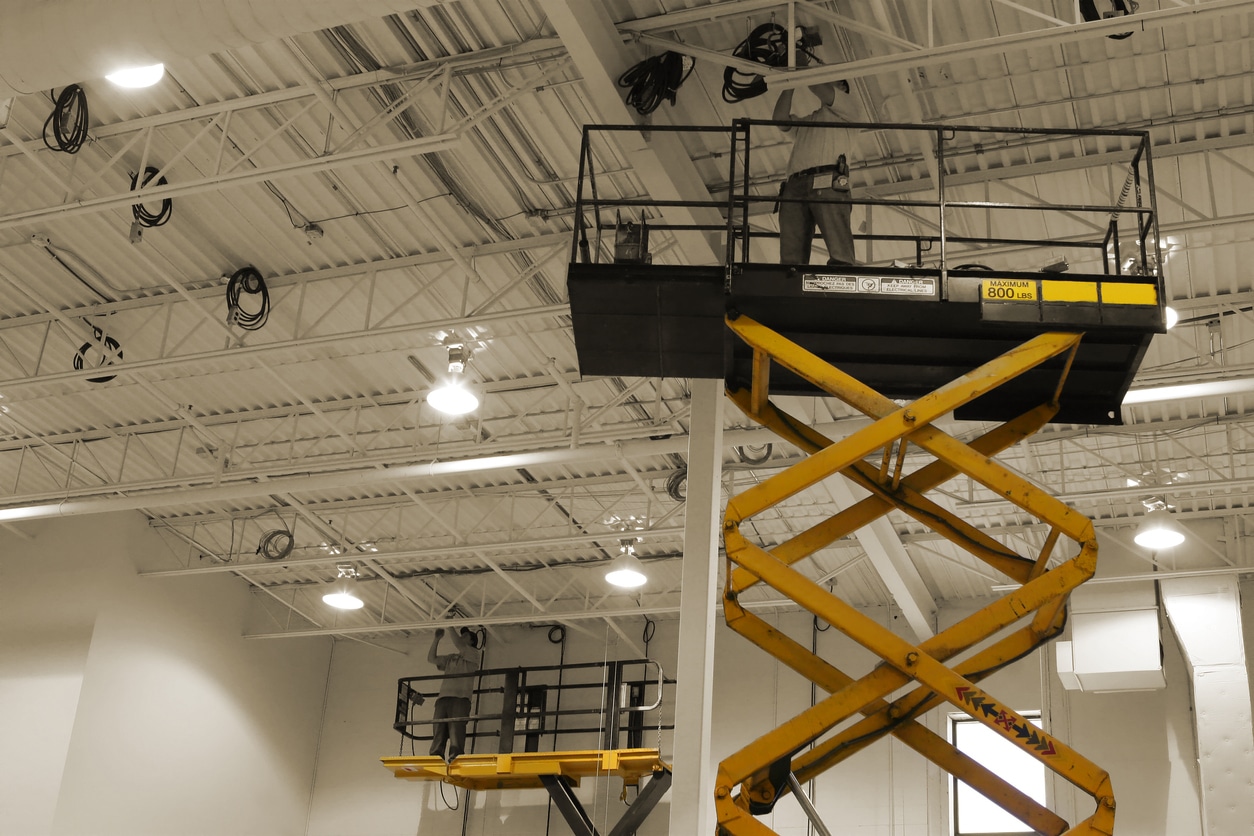 If you need any electrical work done in a commercial building, it is absolutely necessary to engage a qualified and experienced commercial electrician. Because electrical work in commercial settings calls for a different level of ability and experience compared to residential electrical work, it is highly necessary to hire a licensed electrician who is capable of handling any and all electrical needs. In the following paragraphs, we will go over the responsibilities of a commercial electrician, the tasks that are usual for someone in this capacity, and the reasons why it is essential to select a business such as Exceptional Electric for your organization.
If you need any electrical work done in a commercial building, it is absolutely necessary to engage a qualified and experienced commercial electrician. Because electrical work in commercial settings calls for a different level of ability and experience compared to residential electrical work, it is highly necessary to hire a licensed electrician who is capable of handling any and all electrical needs. In the following paragraphs, we will go over the responsibilities of a commercial electrician, the tasks that are usual for someone in this capacity, and the reasons why it is essential to select a business such as Exceptional Electric for your organization.
Work That Is Typically Expected Of Commercial Electricians
In commercial structures, commercial electricians are responsible for a wide variety of electrical tasks, such as the installation, repair, and maintenance of electrical systems. At Exceptional Electric, we ensure that all electrical work is completed safely and in accordance with the national electrical code. In addition to working on high voltage systems, commercial electricians provide a variety of electrical services to companies of varying sizes.
What Are the Responsibilities of a Commercial Electrician?
An electrician who specializes in commercial work will provide a variety of services, such as the installation and repair of lighting systems, electrical panels, and circuits. In addition, they offer electrical services for commercial buildings, which include the installation as well as the maintenance of high voltage systems. Commercial electricians provide a variety of electrical services to commercial clients. These services include electrical inspections and upgrades, which are performed to ensure that the electrical system in a commercial building is both up to date and safe.
Work in Commercial Buildings
Electricians that specialize in commercial work typically find employment in a wide variety of commercial facilities, such as office buildings, warehouses, retail stores, and other types of establishments. They provide electrical services to companies of varying sizes and are responsible for ensuring that the electrical systems in the specified buildings are operating in a secure and effective manner. Commercial electricians are trained to handle any electrical need that may arise in a commercial environment, whether it is the installation of new lighting systems or the maintenance of electrical panels.
Commercial Electrical
Electrical work in commercial settings is not the same as electrical work in residential settings and therefore calls for a higher level of competence and experience. Commercial electricians receive specialized training to manage the electrical requirements of businesses, including the installation and upkeep of high voltage systems, as part of this training. They also make certain that all electrical work is carried out in accordance with the national electrical code, thereby supplying businesses with an electrical system that is both trustworthy and secure.
Elevated Voltage
Electrical systems operating at high voltage are rather widespread in commercial buildings; yet, in order to safely work with them, one needs to possess specialized expertise and undergo extensive training. Commercial electricians have the training and experience necessary to operate on high voltage systems, allowing them to ensure that these systems are operating in a manner that is both safe and effective. Commercial electricians are prepared to handle any high voltage needs that may arise in a commercial setting, regardless of whether it involves the installation of a brand new high voltage system or the maintenance of an existing one.
The Working Conditions
Electricians that specialize in commercial work typically find employment in a diverse range of settings, such as office buildings, warehouses, and retail stores. They could also work in industrial environments, providing electrical services to companies and facilities that manufacture goods. Commercial electricians are educated to handle all electrical needs in a manner that is both safe and effective, regardless of the work environment in which they are employed.
Work in Electricity
Commercial electricians are responsible for a diverse array of electrical tasks, such as the installation and repair of various lighting systems, electrical panels, and circuits. In addition, they offer electrical services to commercial clients, guaranteeing that the latter’s wiring configurations are both secure and up to date. Commercial electricians have the training and tools necessary to address any electrical need that may arise in a commercial setting, including high voltage systems and electrical inspections.
Installation of Wiring and Electrical
The majority of an electrician’s time is spent doing wiring and other electrical work in business settings. They are accountable for the installation, maintenance, and repair of electrical systems in commercial buildings, with the overarching goal of ensuring that these systems operate in a manner that is both safe and effective. Commercial electricians are trained and equipped to handle any wiring and electrical demands that may arise in a commercial setting. This includes the installation of new lighting systems as well as the repair of electrical panels.
Why You Should Hire a Professional Commercial Electrician from Exceptional Electric
In order to guarantee operational efficacy, safety, and compliance with applicable regulations, commercial buildings require the services of a trained and experienced commercial electrician. Exceptional Electric is a highly regarded commercial electrician that has a staff of knowledgeable and skilled experts who are able to offer you services of the highest possible caliber.
Commercial Electrical Work
Work in commercial electrical systems is a difficult subject that calls for a high degree of skill in addition to years of relevant professional experience. You may get assistance with all of your requirements for business electrical work from an experienced commercial electrician like Exceptional Electric. Our team of professionals is capable of handling anything, from electrical wiring and installation to maintenance and repair of electrical systems.
High Voltage Work
Work with high voltage in the electrical industry is a specialized field that calls for particular training, experience, and equipment. The team of professionals at Exceptional Electric has the training and tools necessary to handle high voltage work in a manner that is both safe and effective. They make sure that all work involving high voltage is carried out in a secure manner and in accordance with the rules and regulations in effect in the area.
The Working Conditions
Commercial electricians are employed in a diverse array of work settings, including medical facilities, educational institutions, administrative offices, and manufacturing facilities. The requirements and concerns of safety in each of these contexts are unique. The staff of professionals at Exceptional Electric is educated to manage all different kinds of work settings, which ensures that all of the work is completed in a safe and effective manner.
Wiring for Commercial Use
Commercial wiring is significantly more difficult than residential wiring and takes specific knowledge and expertise to install and maintain. All of your requirements for commercial wiring may be met with the assistance of an experienced commercial electrician like those found at Exceptional Electric. We provide wiring services of a high grade that adhere to the relevant codes and are tailored to fit the requirements you have specified.
Type of Electrician
Not all electricians are made equal, and not all electricians are competent to perform commercial electrical work. In order to ensure that they are able to handle the complexities and
breadth of the work involved in commercial electrical work, electricians working in commercial settings need to have specialized training and experience. When you choose a skilled commercial electrician from a company like Exceptional Electric, you can be assured that the work will be of a high quality, as well as efficient and risk-free.
Maintaining Electrical Systems
The proper upkeep of your commercial building’s electrical systems is absolutely necessary if you want to guarantee its risk-free and productive operation. Exceptional Electric is a skilled commercial electrician company that can assist you in the maintenance of your electrical systems, ensuring that they are operating efficiently and in accordance with all of the relevant local standards and regulations. They provide a wide variety of maintenance services that are customized to fit the requirements that you have specified.
Contact Exceptional Electric Today!
Electrical work in commercial settings is a challenging industry that calls for particular knowledge, experience, and expertise. Our team of professionals is capable of handling anything, from electrical wiring and installation to maintenance and repair of electrical systems. We provide services of a high quality that are quick, risk-free, and tailored to your requirements in order to best fulfill your demands. Get in touch with Exceptional Electric for additional information regarding the business electrical services we offer and the ways in which we can assist you with your electrical requirements.
As a commercial business owner, you rely on a safe and effective electrical system to keep your operations operating smoothly. Exceptional Electric understands the importance of reliable electrical services and is committed to offering the finest available solutions for your commercial space.
Why You Should Hire a Professional Commercial Electrician from Exceptional Electric
As a commercial business owner, you rely on a safe and effective electrical system to keep your operations operating smoothly. Exceptional Electric understands the importance of reliable electrical services and is committed to offering the finest available solutions for your commercial space.
Commercial Electrical Work
Work in commercial electrical systems is a difficult subject that calls for a high degree of skill in addition to years of relevant professional experience. You may get assistance with all of your requirements for business electrical work from an experienced commercial electrician like Exceptional Electric. Our team of professionals is capable of handling anything, from electrical wiring and installation to maintenance and repair of electrical systems.
What Does a Commercial Electrician Do?
Commercial electricians are responsible for installing, maintaining, and repairing electrical systems in commercial facilities. They operate with high-voltage systems, intricate wiring, and a variety of electrical equipment. Additionally, they carry out safety checks and guarantee that the electrical systems adhere to safety standards.
Our Commercial Electrical Services
To satisfy the specific demands of your company, Exceptional Electric provides a wide range of commercial electrical services. Our staff of highly skilled and experienced electricians is available respond to any emergency electrical issues you may have. We specialize in installations, repairs, and maintenance of electrical systems, including wiring, panels, generators, and HVAC systems.
Why Choose Exceptional Electric?
We recognize that choosing a commercial electrician is a crucial decision for your organization. That’s why Exceptional Electric stands out from the others. Our team is committed to offering top-notch customer service and is qualified, covered, and bonded. We take pleasure in our dedication to providing great workmanship, guaranteeing that the electrical systems in your company are secure, efficient, and modern.
Contact Us Now
Don’t let electrical problems interfere with how your company does business. For all of your commercial electrical requirements, rely on Exceptional Electric. To arrange a consultation and find out more about our services, get in touch with us right away.
